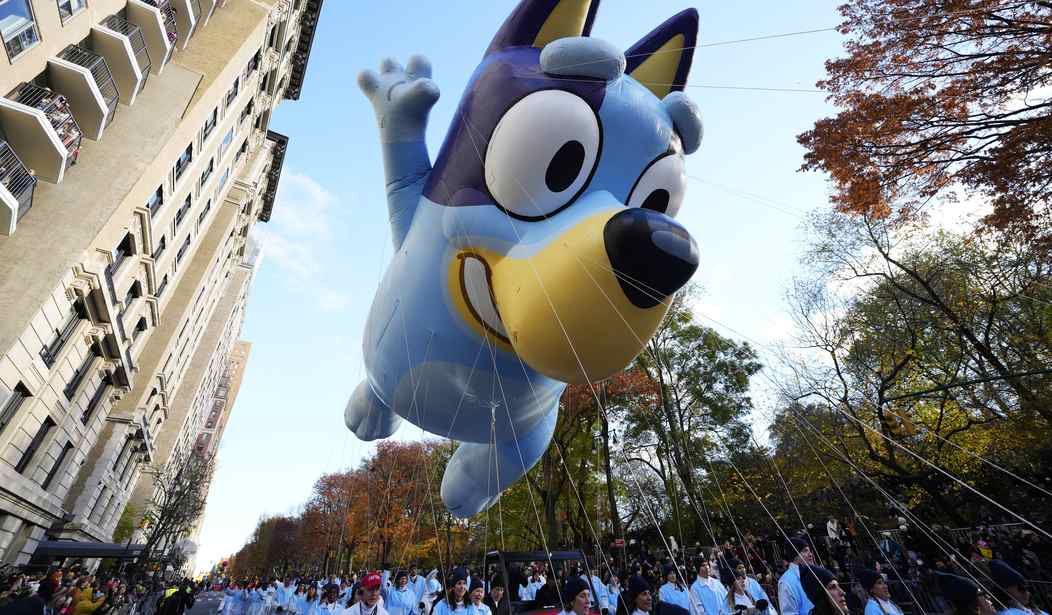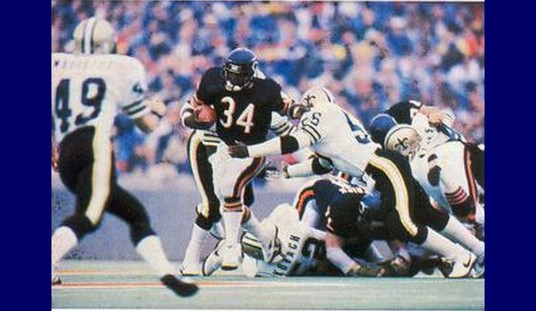The ratings are in, and to almost no one's surprise, the king of the ratings mountain is a little blue dog from Australia.
For those who have never heard of this show, that placement is much deserved, especially considering everything that it's up against. Moreover, given its nature as a children's program, you'd think it would lose out to other shows that are bingeable and rewatchable, such as The Office or Friends.
But Bluey takes the throne.
According to The Hollywood Reporter, Ludo Studio's Bluey is the number one streamed show across all streaming platforms:
Kids’ favorite Bluey has kept its hold on the top of the U.S. streaming rankings for the first half of the year. Nielsen figures for January to June show the series has amassed 25.06 billion minutes of viewing this year — which puts it on a similar pace to last year’s total of 55.62 billion minutes. Bluey has appeared in Nielsen’s streaming ratings (either the overall list or the top 10 acquired series) for 143 straight weeks, dating back to October 2022.
It's not just the leader; it's been the leader for some time.
Why?
For several reasons, and I think these are reasons that many other studios need to pay attention to. Not in the manner of creating their own Bluey clone, but in order to really understand the essence of why Bluey is so popular.
For starters, being a kids' show that children want to go back to over and over again does help. For those who don't have children or who raised children before streaming was available, television shows or YouTube videos that gear themselves toward children have an advantage over many other shows because children and familiarity are best friends. Psychologically, children love knowing what's going to come next and are naturally geared toward pattern recognition.
There's a reason Baby Shark on YouTube has 16 billion views as of this writing. It's because children want you to play the song... then play it again.... and again.
Bluey follows much the same formula, with children wanting to return to the show repeatedly, resulting in massive viewership thanks to returning customers.
But that alone doesn't put Bluey at the top. If that was all it took, Peppa Pig would be somewhere at the top too, but it's not... mainly because the show is terrible to everyone else but children, and that's where Bluey really succeeds. It's not just popular with children.
Adults love it too, not just for their children's sake, but because it's also a fantastic show for parents. In fact, adults believe the show is "cozy," and for good reason. Many people easily attach to the show thanks to its ability to deal in realism, not idealism.
That sounds odd for a cartoon, but let me explain.
For one, Bluey doesn't pick sides in any given debate. It maintains neutrality on pretty much every subject. Even when it's using playtime to depict concepts like evolution, it ends with a nod to Heaven. It doesn't weigh in on gender fluidity, it doesn't even inject a snide remark or hidden joke about political events. Bluey keeps its eye on the ball. If you want to attach more meaning to something than was intended, you can — there's room to do so — but if you try to pull the characters to one side or the other in terms of ideology or stances on social issues... you'd both be right.
But you'd also be missing the show for what it is.
Bluey does a fantastic job of depicting realism in the sense of children's imaginations, their misunderstandings, their virtues, as well as their bratty behavior. It depicts parents realistically as well, with them showing their love for their children, but also their exhaustion, willingness to tease them for their own amusement, and sometimes even their frustrations.
Don't get me wrong, the parents are often idealized in how they also handle situations and the lengths they'll go to in order to make playtime fun and rich, but a lot of this is done up to make the show fun for children. Even in those moments meant for children, adults seem to be able to connect to what's happening.
For instance, there's one episode called "Pizza Girls," where Bluey and her little sister are making mud pies they pretend are pizzas. They sprinkle flower petals and other yard trimmings on it as toppings, and then deliver these "pizzas" to the adults via their foot-powered plastic car. At one point, their aunt and uncle come over with their cousins, and the play expands a bit, with the kids playing as pizzeria owners as the adults sit around a campfire as the evening goes on.
I've experienced both of those kinds of nights, and both of them have a sort of magic to them. I remember being the kid playing with my cousins and friends as our parents stood around drinking beers and having a good time as the night went on, and they were some of the happiest moments of my childhood. Likewise, I've been the parent sitting and talking with my siblings and friends as my kid played with his cousins happily in the yard.
"Pizza Girls" is one of my favorite episodes because it taps into a state of happiness I've experienced on two levels, and it does so without resorting to bombastic elements, flashing colors, superheroes, or other things that children's television shows do to keep your kid's attention.
Another episode titled "Taxi" has the family engaged in a game where Bluey is a taxi cab driver, and her father Bandit is desperately trying to get to the airport as quickly as possible. The entire episode takes this basic premise and uses imaginary people, complications, and twists to create an imaginative game. There's no ripple effect that suddenly shows you that Bluey is actually driving a taxi cab. The entire episode takes place in one room where two brooms, a desk, and some chairs make up the taxi, and you fill in the rest with your own imagination, just like everyone in the show is. Moreover, it's raining outside, making the inside play all the more cozy and intimate.
Bluey does a superb job of making you participate in the game without being there.
And this is something I think a lot of people miss. Bluey is a children's show that doesn't treat you or your kid like an idiot. It trusts you to fill in the blanks for yourself when it's telling a story or depicting an event. This makes it just as fun for adults as it is for children.
As a result, you have entire families happily going back to watch reruns of Bluey over and over again. A lot of people talk about some of the adult-level storylines, such as "Baby Race" (centered around a parent's anxieties and insecurities about how they're doing as one) or "Onesies" (deals with the emotional hardships of infertility issues, specifically for women), and while these are emotional, hard-hitting episodes, the underlying magic of Bluey is that it trusts its viewers to put these things together and come to their own conclusions based on their own experiences.
And I think these are qualities that, frankly, you don't see in a lot of programming nowadays, even adult programming. Bluey has respect for its audience, whether big or small. It's not trying to sell you anything, not trying to push an idea, it's just there to live with you and your experiences. It plays on your nostalgia while relating to you where you are. It makes you feel like a child again while making you want to hug the ones you have.
That's why Bluey is king, and will be for the foreseeable future, especially if other studios and creators don't get what Bluey is truly doing right.














